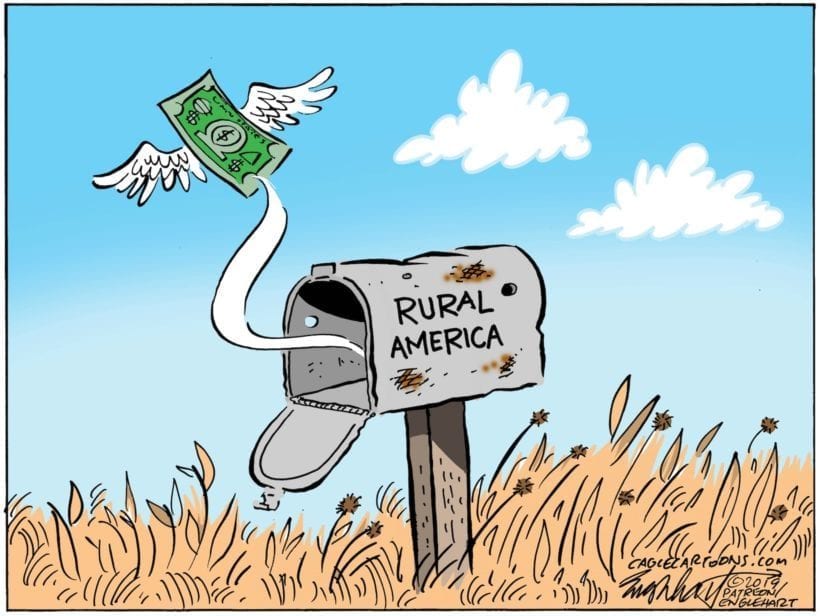BY JIM HIGHTOWER
Farm Aid, the top-notch group of researchers and advocates who’ve tracked family farm issues for nearly 34 years, reports that just two giants now control 60% of all raw milk processed nationwide – a concentration that works to suppress the farm price of milk. But the processor monopoly is more severe than that number suggests.
Because of rigged marketing rules and the perishable nature of milk, farmers sell regionally, and these markets are even more locked down by the Big Two. The largest – Dean Foods, an $8 billion behemoth – controls 90% of dairy markets in Wisconsin and Michigan, 70% in New England and 70%-90% in several other states.
Most of today’s farm commodities are sold into noncompetitive markets controlled by fewer and fewer multinational corporations. For example, the Big Four processing/marketing giants control production of 55% of all turkeys, 59% of chickens, 66% of hogs, 70% of soybeans, 80% of corn and 84% of beef. Again, the real level of price-busting concentration is greater than these percentages indicate, for most of the regional markets where farmers actually sell are controlled by only one or two buyers.
Notice, though, that the same corporate powers holding down farm prices are holding up consumer prices. Every year, less and less of each food dollar we spend goes to the people who produce, and more and more to enrich monopolist middlemen. The USDA reports startling and growing income inequality between farmers and corporate interests: Less than 15 cents of your food dollar now goes to farmers.
Being at the mercy of monopolistic commodity buyers is only part the farmers’ plight. For farming supplies, they also must deal with a handful of noncompetitive sellers for such expensive essentials as seed, tractors, fertilizers and crop loans. For instance, just two corporations [John Deere and CNH Industrial] control nearly half the U.S. farm machinery market. Aside from price, these manufacturers gouge farmers with such devious ploys as prohibiting them or local shops from repairing their own machines. Instead, the companies mandate expensive, time-wasting reliance on often distant dealerships.
For diabolical manipulation of market power, though, few can match the raw greed of seed monopolists. Until recently, these kernels of new life were sold in a vigorously competitive market, but the seed industry has rapidly devolved into a rigidly controlled global cartel run by a handful of biotech giants.
In 1996, farmers [and gardeners] could buy from some 600 independent seed companies in the U.S. By 2009, only 100 remained. By 2016, just 10 corporations controlled 75% of the global seed market. And in the short time since, a series of megamergers has essentially eliminated the competition: Dow Chemical took over DuPont; ChemChina swallowed Syngenta, the Swiss biotech conglomerate; Germany’s BASF bought out multiple seed producers; and Bayer, the voracious German colossus, has been allowed to consume Monsanto.
Today, two-thirds of the world’s crop seed supply is controlled by only four private entities – with Bayer controlling a quarter to a third of the global seed market. In just two decades, U.S. farmers have seen the price of seeds for major row crops nearly quadruple, even as the pay they receive for raising those crops has plummeted.
Even worse than the monopolists’ pricing is their use of their financial and political clout to establish a legal fiction that allows them to own patents on seeds, the most fundamental resource in agriculture. They’ve genetically tampered with seeds to make corn, soybeans and other crops withstand heavy applications of toxic, weed-killing chemicals. And who are the biggest peddlers of these chemicals? The seed monopolists. [Bayer sells $12 billion in ag chemicals, 21%-22.9% of the global agrichemical market.] Thus, farmers are now doubly squeezed by higher-priced patented seeds and by the cost of the expensive chemicals they require.
Meanwhile, the seed monopolists prohibit farmers from saving seeds from this year’s crop to plant next year’s [a practice as old as agriculture]. It’s a deliberate restraint of trade that shackles farmers to abusive corporate masters, nature to ever-more-toxic pesticide regimens and humanity to monocultures vulnerable to pandemic crop disease and climate change.
Fortunately, there are many good folks working to support our farmers and fight ag monopolies. For 30-plus years, Willie Nelson, Neil Young, John Mellencamp, Dave Matthews and friends have headlined Farm Aid’s star-studded all-day extravaganzas to raise money and awareness to help keep family farmers on the land.
But Farm Aid works year-round: Its 800-FARM-AID hotline and Farmer Resource Network support farm families in crisis, finding resources to access new markets, transition to more sustainable, profitable practices – and survive. Visit FarmAid.org for more information.
– Jim Hightower’s columns appear regularly in The Oklahoma Observer
Creators.com








